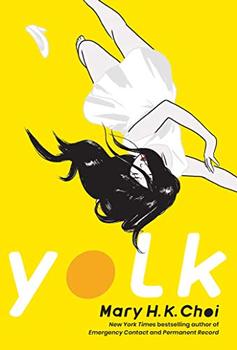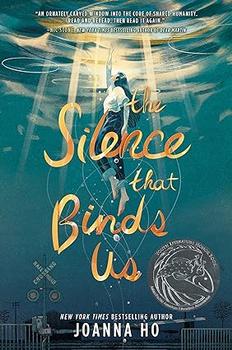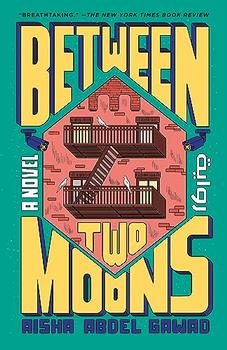Summary | Excerpt | Reviews | Beyond the book | Read-Alikes | Genres & Themes | Author Bio

Mary H.K. Choi's young adult offering Yolk deftly maintains several plotlines running through the life of main character Jayne, a Korean American college student in New York City. Jayne's older sister, June, learns she has uterine cancer, and the question of whether she will recover lingers over the course of the novel. In order to pay for her treatment, recently unemployed June adopts Jayne's identity so she can use her sister's school medical insurance — a narrative touch that critiques the American healthcare system, adds a minor thriller element to the story, and leads the reader to wonder whether June will be caught in an act that, however necessary, constitutes a crime. Along with this secret, June wishes to keep her illness from the girls' parents entirely. Beneath the central current of the plot lies Jayne's continual struggle with an eating disorder, as well as her prospective romance with a childhood acquaintance from the sisters' hometown in Texas, Patrick, who now also lives in NYC.
One might expect these story elements to all neatly resolve, even if in tragedy. Instead, Yolk settles into an absorbing and relaxed portrayal of Jayne, who as first-person narrator makes astute and often humorous observations of herself and the physical world around her. While visiting her sister early in the novel, she casts a critical, unhurried eye over June's swanky high-rise residence: "There are tasteful sitting areas and hardcover art books on the coffee table that are ripe for stealing by anyone other than the people who can afford to live here." When the doorman asks if she is June's sister, Jayne remarks, "Feels racist even if it's true." Despite the significance of her sister's cancer diagnosis, most of the novel is about how Jayne's everyday concerns have been shaped by her past, a focus embodied in her frequently difficult relationship with June.
Choi's main agenda doesn't seem to be answering the questions posed by the story so much as seeing them through to a stage where they can be gracefully abandoned, leaving the reader to reflect on the larger issues they raise. This approach is both surprising and successful; in fact, the sheer amount of information given about Jayne in the book's 400-some pages is more than is needed for it. However, the extended backstory of her childhood and teenage years in Texas still provides interesting, valuable material for readers, perhaps especially young people who can see themselves in her experience.
The plot structure is also appropriate considering that living with uncertainty is a unifying theme in the book. Uncertainty is a simple fact of reality, as is shown by June's cancer diagnosis at the age of 23. But Choi also reminds us that the world we live in demands that we act with a level of certainty we can't possibly have. June is pressured to consider freezing her eggs before having her reproductive organs removed, in case she wants to have children in the future. Jayne is aware that the decisions she makes concerning her education may affect her for the rest of her life, but she is still trying to recover from a childhood and adolescence steeped in racism as well as the insular world of her family's Korean Catholic circle, of which Patrick was a part. Her attraction to Patrick is wrapped in the comfort she feels around him due to their similar background, but it becomes clear that her previous habit of dating a particular kind of selfish white man, like her disordered eating, is a result of her desire for a different kind of predictability — in a way, she prefers a bad predictable outcome to the higher stakes present in pursuing a fulfilling relationship with someone she cares about.
While exploring the dangers of courting this type of control, Yolk is also an ode to the stability offered by familiarity and routine — June makes a point of cooking a favorite dish, mapo tofu, for herself before a doctor's appointment, and continually re-watches the show Gilmore Girls (see Beyond the Book). Food figures into this mode of stability but plays a double-edged role: It is how Jayne abuses herself, yet in the presence of those who care for her, like June and Patrick, it creates a link to possibilities of family and community that she otherwise lacks. These two roles meet when Patrick takes Jayne out for breakfast at a diner and she observes that breaking the yolks of the fried eggs on her plate makes it easier to obscure how little she has eaten. The yolks symbolize both potential and destruction — and, more specifically, Jayne's impulse to destroy certain elements of her life before they have a chance to develop.
In dealing with issues specific to the transitory nature of late adolescence for a young adult audience, Choi also effectively addresses the combined pressure and hunger that comes with being a child of immigrants — the sense of being deprived of a standard-issue existence alongside the impulse to push aside this deprivation to make way for success. She shows how these feelings may result in a desperate need for love and acceptance that can, somewhat insultingly, only be found by embracing the unpredictable nature of life. Her decision to wrap up certain plot points while leaving others hanging feels deliberate, a statement about how difficult the slightest uncertainty can feel even when an outcome appears hopeful. This choice also functions as a reminder that it is still preferable to exist fully in the spaces in life that feel risky and fraught, as they are necessary to the experience of being human.
![]() This review was originally published in The BookBrowse Review in April 2021, and has been updated for the
March 2022 edition.
Click here to go to this issue.
This review was originally published in The BookBrowse Review in April 2021, and has been updated for the
March 2022 edition.
Click here to go to this issue.

If you liked Yolk, try these:

by Joanna Ho
Published 2023
Joanna Ho, New York Times bestselling author of Eyes That Kiss in the Corners, has written an exquisite, heart-rending debut young adult novel that will inspire all to speak truth to power.

by Aisha Abdel Gawad
Published 2023
Set in the Arab immigrant enclave of Bay Ridge, Brooklyn, following three siblings coming of age over the course of one Ramadan.
Discovery consists of seeing what everybody has seen and thinking what nobody has thought.
Click Here to find out who said this, as well as discovering other famous literary quotes!
Your guide toexceptional books
BookBrowse seeks out and recommends the best in contemporary fiction and nonfiction—books that not only engage and entertain but also deepen our understanding of ourselves and the world around us.